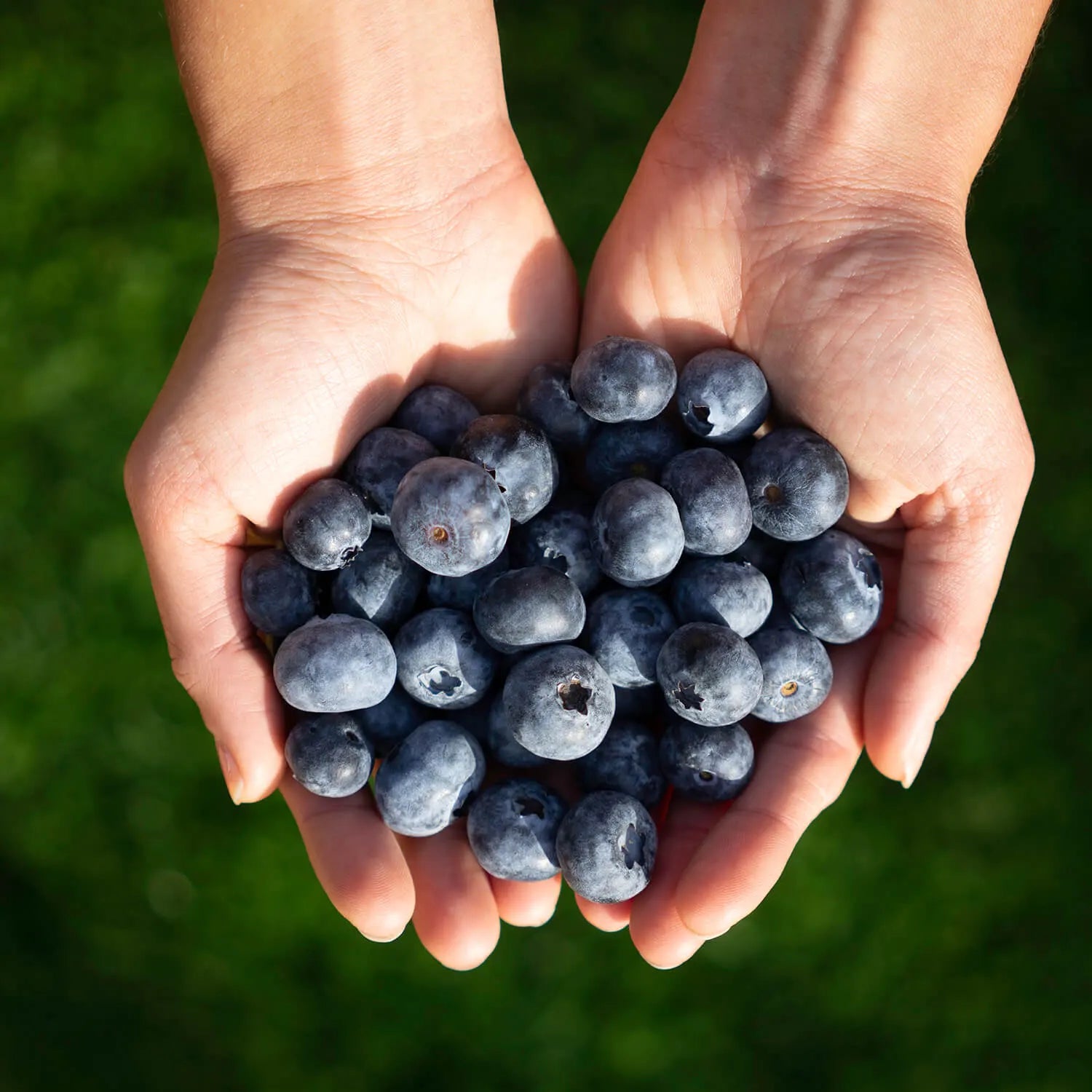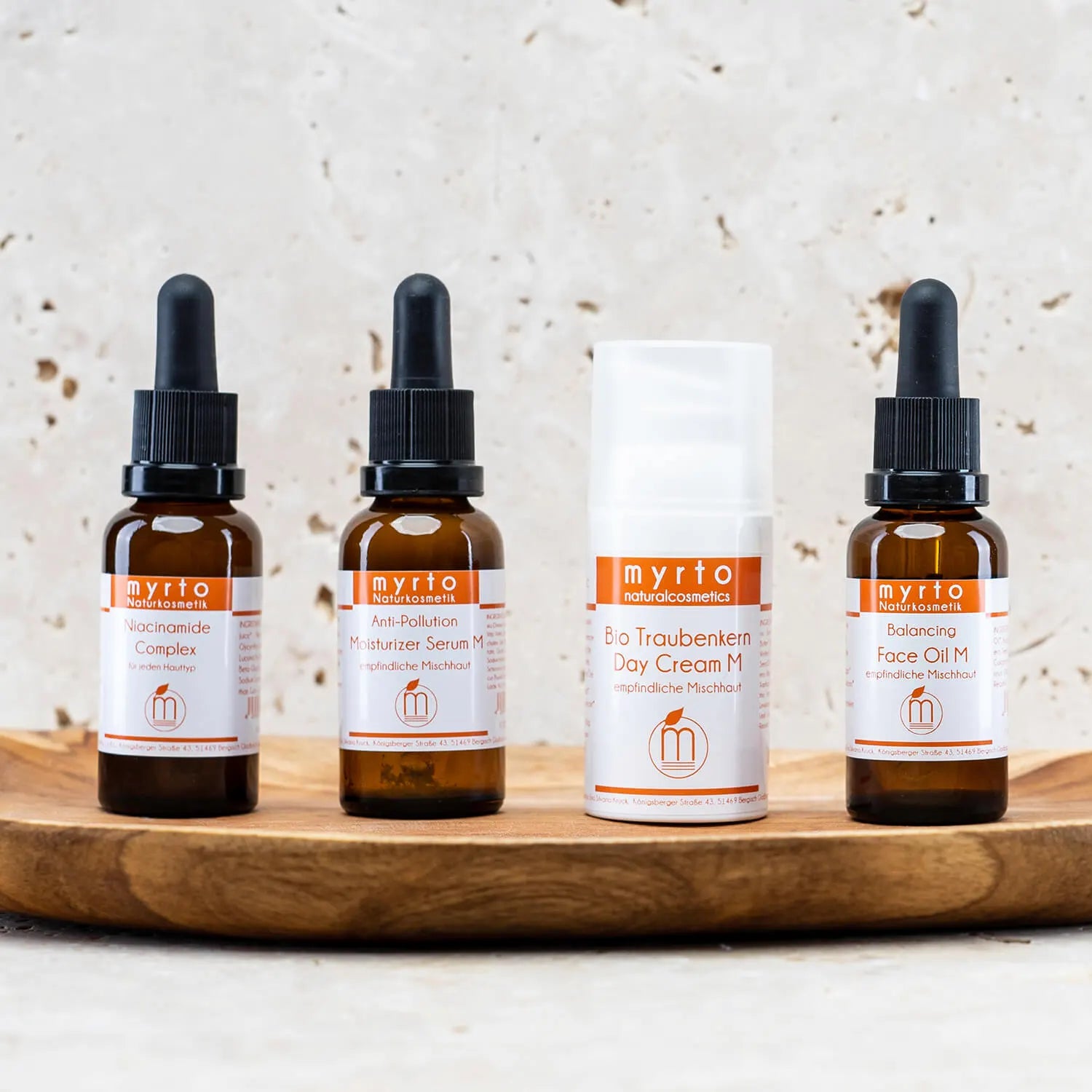
Anti-inflammatory diet against pimples and acne
The skin as a mirror of our diet
Healthy skin and shiny, beautiful hair - these attributes are associated with the internal health of the body. Our food plays a crucial role in this. A healthy diet not only increases our well-being and prevents numerous diseases, but it also improves the appearance of our skin. A healthy diet is closely linked to skin aging. It also prevents inflammation in a completely natural way.
Inflammation is the body's own response to harmful stimuli and foreign substances. Impure skin, large spots and acne in adulthood are usually the result of chronic inflammation in the body. The right diet can help to heal the inflammation and improve the skin's appearance. Skin diseases such as rosacea, neurodermatitis or psoriasis can also be alleviated with an anti-inflammatory diet. Sugar, wheat flour and dairy products in particular have a negative effect on the skin's appearance. These and other foods can trigger and worsen spots, pustules and flare-ups over the course of the disease.
Less sugar
Foods and drinks that contain a lot of sugar make us fat and sick. They have a high glycemic index. This means that they cause blood sugar levels to rise rapidly. They only create a short-term feeling of satiety. This makes sugar less healthy than foods that cause blood sugar levels to rise slowly.
High sugar consumption acidifies the body. Sugar therefore promotes inflammation in the body, which in turn causes pimples and other skin problems. Sugar is also responsible for the breakdown of collagen fibers that keep connective tissue youthfully firm. Increased sugar consumption reduces the elasticity of the skin and accelerates skin aging.
To reduce your sugar consumption, you should eat fewer ready-made products. These have a consistently high sugar content without you noticing it. This applies to pizza, snacks and nibbles as well as marinades and salad dressings. Ready-made products are generally over-seasoned, too fatty and contain hardly any vital nutrients. If you cook yourself instead, you can gradually reduce the sugar content of your sweet dishes and instead refine the natural taste with spices such as pure cocoa powder, vanilla, cinnamon, cardamom or grated lemon peel from organic lemons.
Spelt & whole grain instead of wheat flour
The usual wheat flour causes a rapid increase in blood sugar levels. Modern wheat varieties with their targeted resistance breeding and pesticides such as glyphosate are considered to promote inflammation and can be responsible for intolerances. Wheat is suspected of worsening acne and skin problems.
The frequently crossed, backcrossed and selected wheat varieties lead to increased flatulence. Not least, the industrial dough processing in large bakeries makes ready-made wheat baked goods difficult to digest. While the dough in traditionally made yeast and sourdough breads rises for several long days and thus ensures good digestibility, the dough rising times in a modern large bakery are usually only 1 hour due to time constraints, meaning that the natural flavours cannot develop. The approximately 200 permitted additives in conventional bread such as preservatives, flavourings, consistency agents and emulsifiers can also lead to stomach rumbling, a feeling of fullness or diarrhea. There is a direct connection between intestinal health and healthy skin as part of our detoxifying immune system. This explains why your skin condition deteriorates when healthy intestinal function is disturbed.
Instead of refined wheat flour, you should try whole wheat or spelt flour - unless you suffer from gluten intolerance and have to switch to gluten-free pseudo-cereals anyway. Spelt is less denatured by breeding. It contains more and higher-quality protein, more vitamins and minerals. Spelt also has a higher proportion of fiber and unsaturated fatty acids. Instead of conventional white flour ready-made baked goods from large bakeries, prefer baked goods and pasta made from organic spelt or whole wheat. Above all, try to make your own bread and cakes as often as possible - not least to avoid additives.
The effects of milk on the skin
Milk is an easy choice for athletes in particular to ensure that the body gets enough protein after training. However, the consumption of milk has come under increasing criticism in recent years. The doctor and nutrition pioneer Dr. Max Otto Bruker warned more than 40 years ago about the harmful effects of milk consumption. After all, the hormonal components in cow's milk are intended for the rapid growth of calves and not for the nutrition of adults.
Scientists assume that the hormones contained in cow's milk worsen the skin's appearance and play a role in the development of acne. Studies have found that men who consume too much milk have increased estrogen levels, which also seem to be linked to reduced sperm production. Pure cow's milk in particular can stimulate excessive activity of the sebaceous glands. The acne-causing components are not so much in the fat content, but rather in the milk protein. Fermented milk products such as yogurt, protein-rich quark, whey or cheese are generally better tolerated. They keep you full for a long time, but should not be eaten too often in an anti-acne diet.
For clearer skin, you should focus more on plant-based protein from oatmeal, lentils, chickpeas, chia seeds, hemp seeds and soybeans. Combine different protein sources in your meal to increase bioavailability for your body.
The best way to find out whether dairy products are actually responsible for your skin problems is to temporarily eliminate all dairy-containing foods and replace them with vegan alternatives made from oat, almond or soy milk. However, it can take up to 3 months for your skin to actually react to the change.
Choosing the right fats
Animal fats
The right choice of healthy fats plays a key role in getting rid of stubborn spots. A diet rich in animal fats from meat, butter, cheese and eggs makes your body acidic and clogs it up. In addition, the alien animal hormones throw your hormonal system out of balance. Medicines and antibiotics from modern factory farming promote resistance and weaken your immune system. Therefore, eat only a small amount of animal fats or prefer a purely vegan lifestyle.
Vegetable fats
An anti-inflammatory diet should be rich in vegetable fats. However, refined, highly heated and hardened oils such as palm oil, which is used in large quantities, are harmful to health. Industrially processed palm oil is mainly found in ready-made products, from pizza and chips to biscuits, snacks and also in the vast majority of cosmetic products.
What's the problem with that? During industrial refining, palm oil is heated to over 200 degrees and then hardened. This creates large amounts of fatty pollutants. The unsaturated fatty acids become so-called trans fats. They increase cholesterol levels and promote chronic inflammation, such as that found in acne, rosacea, neurodermatitis or psoriasis. So generally avoid ready-made products and instead prepare your own fresh food, even if it is much more time-consuming.
Cold-pressed vegetable oils
In your diet, prefer cold-pressed vegetable oils, preferably organic. Due to the gentle cold pressing, these oils naturally contain anti-inflammatory antioxidants and essential monounsaturated and polyunsaturated fatty acids. Olive oil and rapeseed oil in particular have a high proportion of monounsaturated fatty acids (Omega 9). Walnut oil, hemp oil and linseed oil are rich in polyunsaturated fatty acids (Omega 3), which have a positive effect on the skin and relieve some skin problems. Animal meat, butter, cheese and eggs as well as sunflower, soy or corn oil in particular contain a high proportion of Omega-6 fatty acids.
Our body needs both Omega 3 and Omega 6 and 9 fatty acids, and they should be present in an optimal ratio in your diet. Most people in Europe consume too many Omega-6 and too few Omega-3 fatty acids due to their high meat consumption.
Even though cold-pressed vegetable oils with polyunsaturated omega-3 fatty acids are particularly valuable due to their antibacterial and anti-inflammatory effects, use them sparingly in your diet: about 1-2 tablespoons per day, for example in a vitamin-rich green salad or raw vegetables, is completely sufficient. Above all, you should not heat these oils.
Micronutrients for healthy skin
Micronutrients are essential for healthy cell metabolism and your body's immune system. These include antioxidant vitamins, trace elements and minerals. Since your body cannot produce these vital nutrients itself, you must get them through your diet.
Antioxidants serve as defense and protective substances for plants. They inhibit inflammation and have antibacterial and antiviral effects. They protect cells from oxidative damage. These include, for example, anthocyanins in berries, carotenoids such as beta-carotene in carrots, peppers and green vegetables, or cell-protecting flavonoids in apples, pears or herbs.
Like vitamins and minerals, trace elements are vital for your healthy metabolism. Trace elements with strong biochemical and physiological effects include all minerals that your body only needs in very small quantities: iron, iodine, zinc, fluoride, selenium and manganese.
Seasonal vegetables, whole grains, legumes such as lentils, beans and chickpeas, as well as black tea, mineral water, nuts, seeds and oilseeds are particularly rich in antioxidant micronutrients.
Food diary: Find out which foods cause pimples
A food diary is a great help in finally getting rid of constant redness, stubborn pimples or acne caused by chronic inflammation in your body. In it, you document for at least a few weeks which critical foods you have tried to avoid and how this has affected your skin. This is the best way to track down potentially problematic foods that keep causing you problems, intolerances and unhealthy eating habits that are damaging your body. In the long term, try to replace potentially inflammatory foods with anti-inflammatory alternatives.
Conclusion
- To get rid of pimples and improve your skin's appearance in the long term, you should change your diet to anti-inflammatory foods, preferably plant-based and unprocessed foods.
- Avoid cow's milk and, to a large extent, fermented milk products.
- Try replacing refined wheat flour with whole wheat or spelt flour.
- Cook for yourself as often as possible and avoid ready meals. Your diet should contain plenty of fresh and fiber-rich vegetables such as carrots, peppers, cauliflower, broccoli, spinach, peas or kohlrabi.
- Reduce animal fats in your diet and instead prefer natural vegetable fats with monounsaturated and polyunsaturated fatty acids (Omega 9 and Omega 3) such as olive oil, rapeseed oil and hemp oil.
- If you're feeling a little hungry between meals, instead of unhealthy sweets with refined sugar, snack on seasonal fresh berries, filling and high-fat nuts and seeds, vitamin-rich apples, pears and citrus fruits from organic farming. Dried fruit is also a good alternative because it contains valuable micronutrients in addition to the high proportion of natural fruit sugar.
Is an anti-inflammatory diet enough to get rid of pimples and skin problems?
A diet rich in vital nutrients, plenty of exercise in the fresh air and less psychological stress alone are not enough when it comes to recurring redness, under-layers and stubborn pimples.
It is also essential to have the right skin care routine that is tailored to your individual skin needs. Your cosmetics should be free of additives such as preservatives, alcohol, fragrances and emulsifiers. The ingredients must not be comedogenic, i.e. they must not clog the pores under any circumstances.
A particularly high-quality, anti-comedogenic plant oil for improved sebum flow and against keratinization of the sebaceous glands is cold-pressed grape seed oil, which is contained in all of our myrto facial care products for sensitive combination skin. Argan oil, jojoba oil, tamanu oil, black cumin oil and hemp oil also have healing properties and are recommended for impure and problematic skin.
The best active ingredients against pimples, acne and inflamed skin
Copaiba balm – considered the most powerful herbal antibiotic against bacterial skin diseases and acne, contained in the Copaiba Blemish Serum;
Magnolia bark – works against inflamm-aging, i.e. against inflammation, which at the same time accelerates the aging process of the skin, contained in Magnolia Calming Serum and Magnolia Toner Sensitive .
Niacinamide – soothes redness and inflammation, refines the skin’s appearance, contained in the Vitamin Serum and the Anti-Pollution Serum M ;
Vitamin C – relieves micro-inflammations in the skin, stimulates collagen production, reduces pores, contained in the Vitamin Serum and the Anti-Pollution Serum T ;
Bakuchiol – fades acne scars, counteracts inflammation and blemishes, tightens the skin, contained in the Bakuchiol Oil Serum and the Vitamin Serum ;
Willow bark extract – has a sebum-dissolving effect, soothes redness and inflammation, contained in the Anti-Pollution Serum M .




